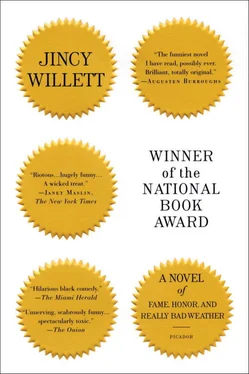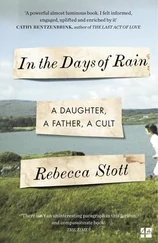The Tail
I still don’t believe she’s coming full force, but it looks pretty bad. I haven’t spotted a single bird all day today. Where do they go? The electricity went an hour ago, but I don’t need it to read, although the light through the window is rather nauseating, the color of an illuminating bruise. Not much rain, but a hell of a lot of wind. I finally broke down and masking-taped all my windows, so I must be taking this seriously.
The phone was still working the last time I checked, and Anna was enjoying herself. I don’t worry for her safety: The trees around our house are small, mostly birches; even if all of them fall, which they’re not likely to do, they can’t effect any serious damage. She’s rounded up all the candles in the house, and set out a pile of books to read: a Ruth Rendell, Mansfield Park, and one of her favorite Sherlock Holmes stories, “The Final Problem.” She must be on an English kick.
Of course I didn’t bring a transistor radio with me. That’s the kind of prideful old bat I am.
There’s no one out in the street, on the Mile. Ten cars sit abandoned in the Food Land parking lot, and around back I can just make out the rear of a single trailer truck, looks like an Eclipse Syrup truck, hopping from side to side in an irate fashion. Wind must be pretty strong.
Right across the street a big show is in the making. Some slob apparently started to offload boxes of junk at the Job Lot, then took off without closing up the truck, and already two boxes have come loose, banging up against the Tile World sign, taking out the W, and spilling their contents into the air. Anybody fool enough to step outside right now could get whanged by a bagful of defective dice, impaled by crooked golf tees. Some of it has already made it across the street; two of my cherry trees have been decorated with knee-high-hose eggs and what looks like a plastic (it must be) likeness of the Blessed Virgin.
My guess is that we’re at the outer edge. Pandora is playing crack-the-whip with Frome, and her eye could be fifty miles away. A hundred perhaps. Or maybe not. I’ve never been in the Eye.
Mother and Father told us about the big one, the ’38 hurricane, which came along three months before we did, on September 21. Father was in New London on business, and he saw the Eye. (Mother saw it, too, in Frome, but she was the only Rhode Islander who did.) He’d taken the train down, but couldn’t very well take it back after a tidal wave deposited an enormous Coast Guard lighthouse tender, by the dainty name of Tulip, across its tracks. Father witnessed explosions, fire, and floods on that amazing day, but we could never get him to talk much about the devastation. I suspect he saw dead bodies; it was not like him to dwell upon the tragic. Besides, nothing he saw that day, he told us many times, compared to the experience of the Eye.
This was one of his favorite dinnertime topics. He was worried about Mother, he would begin, home alone and pregnant with us. He wasn’t worried for her safety—she was inland, as I am today—but he knew she’d be anxious for him. And I was, she would chime in, but bad as the storm was, here at home, I had no idea that it was anything more than a bad storm. We didn’t hear the word “hurricane” on the radio until the next day.
Nobody in New England knew what a hurricane was, Father said. I thought it was the end of the world. First the rain, and then the wind, sounded like a hundred trains, and from the second floor of the Mohican Hotel you could hear windows, hotel windows, department store windows, popping like corn.
Then it stopped, and the sun came out. Father ventured outside to help clean up. The sky was blue, he said, but the sea was the awfulest shade of yellow you ever saw. The shade the Devil’s eyes would be, said Father, who was ordinarily no devotee of the supernatural. The main street was littered with boats of all sizes, dinghies, sailboats, part of someone’s yacht, the Amphitrite, and not far from where he wandered the entire business section of the city was on fire, casting up clouds of pitch-black smoke, but he was drawn to the water-front. It made no sense to go near it, he said, as the water so clearly meant to come for us, but none of us could help ourselves. The land was full of boats and the sea was full of piss (“Say ‘urine,’ Jabez”), and the sunshine was wrong, he realized, the wrong color, and the air felt wrong too. And looking far out over the evil sea, he saw a wall of white cloud, and when he turned around he thought he could just make it out, the white wall, way beyond what few rooftops remained, and gradually he came to realize that they stood in the middle of a huge circle of still light, and all around them the world wheeled.
We were in this cylinder of quiet, he said, and the walls were moving, slowly but perceptibly, counterclockwise. It was, he said, like standing in an inside-out merry-go-round. He wished with all his heart that he could stay in the circle forever, moving with it until he found our mother. But the walls were closing in, and there was nothing to do but face up to whatever was behind them.
Abigail always wanted details, sensory details, what did the upended cars look like, and the women, how were they dressed, and did the wind rip off people’s clothes, and she always wanted to hear more about the fires, and the waves. She was disappointed to learn, I recall, that there was no lightning. Although I remember Father’s words, dutifully, like a recording secretary, I remained imaginatively back in Frome with Mother, and those bafflingly obtuse radio bulletins. They called it a storm, a nor’easter, a fierce blow ; by the time they came up with its proper term it was history. How could that happen? I would ask, how could people be so ignorant, and our parents would explain, again, about Neville Chamberlain, and Czechoslovakia, and how even on that terrible day the only history that mattered was happening in Europe.
It occurs to me today that the entire northeastern seaboard of America was like Icarus in my favorite Auden poem, a boy falling out of the sky, unmourned by a world that had somewhere important to get to. About suffering they were never wrong, the Old Masters.
I used to believe that conversations like this, seminal adult talk, drove me to books, the obvious best refuge and bulwark against a perilous world. Now I know this isn’t true. I had no choice. My choice was made for me, and Abigail’s for her, in the womb.
• • •
And I wonder what is really happening today, right now. My sister, safe inland at the ACI, must have fewer clues than I. The walls there are too solid for buffeting, and I’m not even sure she has access to a window. But if she does, if she can see out, she is in the storm, effortlessly, one with the wind and rain, ravenous, scouring the perceptible earth for every last detail. My sister knows what’s really going on. My sister always knows where she is.
I see the ceiling lights flicker and dim, I hear the wind and the pitiful creaking of dying trees, my skin feels raw, hypersensitive, not like a fever but like something opposite, an enlivening chill; outside my library articles of evidence mount up, jitterbugging, smacking into one another, slapping up against my windows. Clearly something momentous is happening. But I cannot say what it is. I will not know until it is over, and I can name it. I can’t help this. This is what I am.
Chapter Nineteen
Winged Hedgehog

Читать дальше













